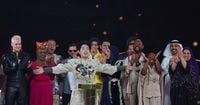On the night of September 20, 2025, Moscow’s Live Arena pulsed with music, light, and no small measure of political intrigue as Vietnam’s Duc Phuc was crowned the first-ever winner of the newly revived Intervision song contest. The event, a dazzling spectacle reminiscent of Eurovision but with a distinctly Russian twist, marked Russia’s return to the international music stage after being barred from Eurovision in 2022. Yet, beneath the glitz and glamour, Intervision was as much about geopolitics and cultural messaging as it was about melody and showmanship.
Duc Phuc’s victory was no small feat. Performing the genre-blending “Phu Dong Thien Vuong”—a heady mix of pop, rap, and dubstep inspired by Vietnamese folklore—the singer captivated the audience and the international jury, earning the top prize of 30 million rubles (about $360,000). “I’m shocked, thank you so much … I couldn’t even imagine that I would win such a large-scale (competition),” he told reporters, expressing gratitude for the support and the unexpected fan base he discovered in Russia. As he held aloft the crystal cup trophy, the Vietnamese star became a symbol of Intervision’s attempt to bridge cultures, at least on the surface.
But the contest’s ambitions went far beyond music. Signed into existence by a special presidential decree in February 2025, Intervision was conceived as a Russian answer to Eurovision—a contest from which Moscow was expelled following its full-scale invasion of Ukraine. President Vladimir Putin, who played a central role in reviving the event, addressed the audience in a pre-recorded video message: “I am confident that the competition will become one of the most recognizable and beloved worldwide, because through dialogue, mutual respect, and the strengthening of trust between cultures, we become spiritually richer.”
With 23 acts from around the globe—including China, South Africa, Brazil, the UAE, India, Cuba, Ethiopia, and Venezuela—Intervision’s lineup was international, though notably skewed toward countries maintaining at least a neutral stance on Russia’s ongoing war in Ukraine. Former Soviet republics such as Belarus, Kyrgyzstan, and Uzbekistan also featured prominently. The contest was broadcast live not just in Russia, but across parts of Asia, Africa, South America, and Europe, with organizers boasting that the participating countries represented nearly half the world’s population.
Yet the event was not without controversy. Moments before the U.S. entrant, Australian-born singer Vassy, was due to perform, organizers announced her withdrawal, citing “unprecedented political pressure from the Government of Australia.” Vassy herself declined to comment further. Her last-minute exit followed the withdrawal of another U.S. act, Brandon Howard, who dropped out three days earlier due to “unforeseen family circumstances.” Despite the drama, the U.S. remained represented on the jury by former Deep Purple vocalist Joe Lynn Turner, but the absence of a U.S. performance underscored the contest’s complicated political undertones.
Russian officials were quick to insist that Intervision was not a tool of soft power. Foreign Minister Sergey Lavrov declared at a pre-contest press conference, “What we are doing is diametrically opposite to the attempts to use sports, art, and any other human activities for political gains.” Nonetheless, both Lavrov and President Putin were highly visible supporters of the event. Lavrov even made an appearance between performances, and Putin’s video message was played before the show began. The contest’s significance as a showcase for a Russia that “has been embraced, not ostracized, by the world at large,” as lawmaker Leonid Slutsky told Tass, was impossible to ignore.
Intervision’s roots stretch back to the Cold War era, when the contest was first held in Czechoslovakia (1965–1968) and later in Poland (1977–1980) as a socialist counterweight to Eurovision. Historian Dean Vuletic, author of “Postwar Europe and the Eurovision Song Contest,” noted, “Czechoslovak and Polish television saw Intervision as a bridge between East and West. They wanted to attract the attention of Western media, Western record companies.” In its modern incarnation, Intervision is again seeking to assert itself as a global cultural force, though with a distinctly conservative and nationalist flavor.
While Eurovision is known for its celebration of diversity and LGBTQ+ inclusivity, Intervision took a different path. Displays of pride symbols were strictly forbidden, and the contest’s official guidelines emphasized the promotion of “universal, spiritual, family, cultural, ethical, and religious traditions of different nations.” One fan, interviewed outside the arena, put it bluntly: “Heterosexualism is very important to us.” The event’s “anti-woke” stance was not lost on observers, and Kyiv dismissed the contest as “an instrument of hostile propaganda.”
The contest’s selection process for participants was somewhat opaque. While rules stipulated that co-organizers—ranging from national broadcasters to individuals—would nominate acts, no public list of these entities was available. This led to a mix of established stars and lesser-known performers. Russia’s own entry, the ultra-patriotic Shaman (Yaroslav Dronov), is one of the country’s most heavily promoted artists. During his performance, he asked the jury not to consider Russia’s act, declaring, “Russia has already won by inviting so many countries to join us.”
Despite the organizers’ best efforts, building a devoted fan base proved challenging. Online casting advertisements offered small payments for audience members, suggesting that enthusiasm among the Russian public was not as spontaneous as organizers might have hoped. Eurovision fan communities, meanwhile, largely ignored or dismissed the new contest, with one comment on a popular Reddit forum reading, “Let the dictators and war criminals have their own little party where they can spout their propaganda and call it a contest.”
Still, some participants and onlookers found value in the event’s international scope. Tajikistan’s Farrukh Hasanov told CNN, “The stage was so powerful that it ate me fully and I couldn’t control my imagination and gave my best on the stage.” Saif Al Ali of the UAE praised the contest’s unifying character: “We have 23 countries performing here today. Music is the language of the community.”
As the night drew to a close, organizers announced that next year’s Intervision would be held in Saudi Arabia—a signal that Russia’s ambitions for the contest are anything but modest. Whether Intervision will achieve lasting cultural impact remains to be seen. As Foreign Minister Lavrov put it, “In Soviet times, the party and government made decisions to promote a positive image of Russia abroad. Today, we must advance an objective portrayal.” For now, the contest stands as a vivid testament to the enduring interplay of power, politics, and performance on the world stage.



